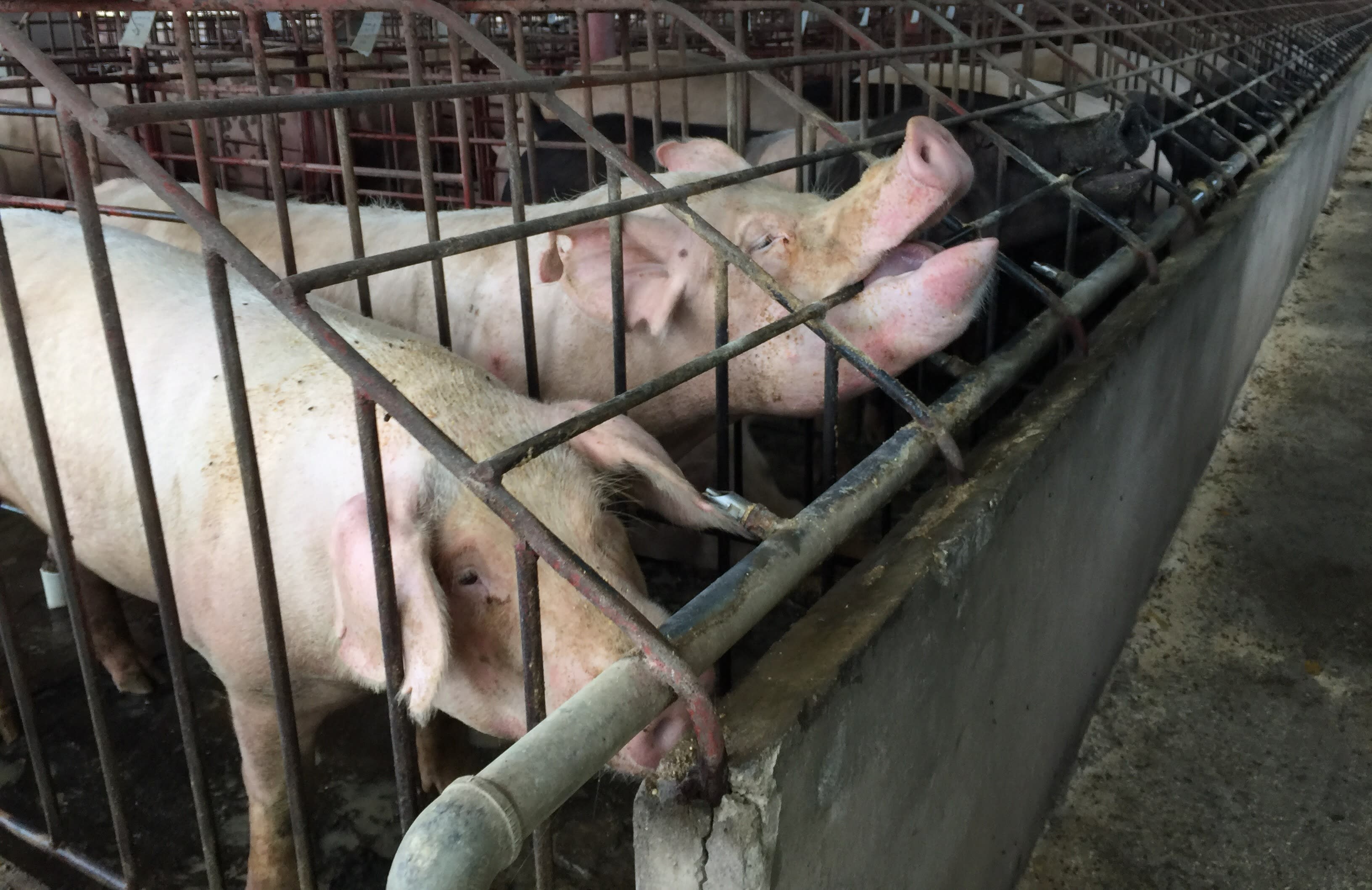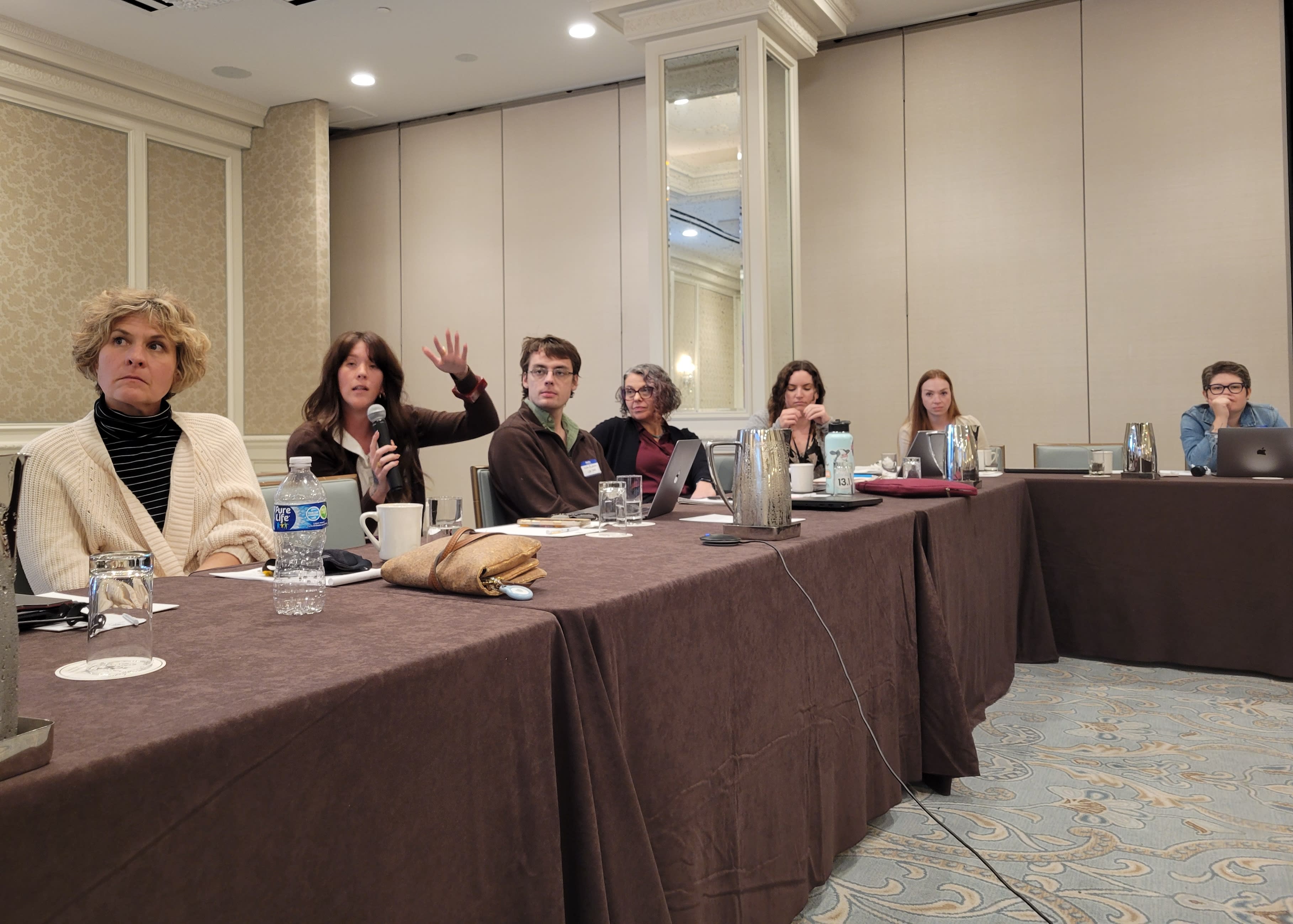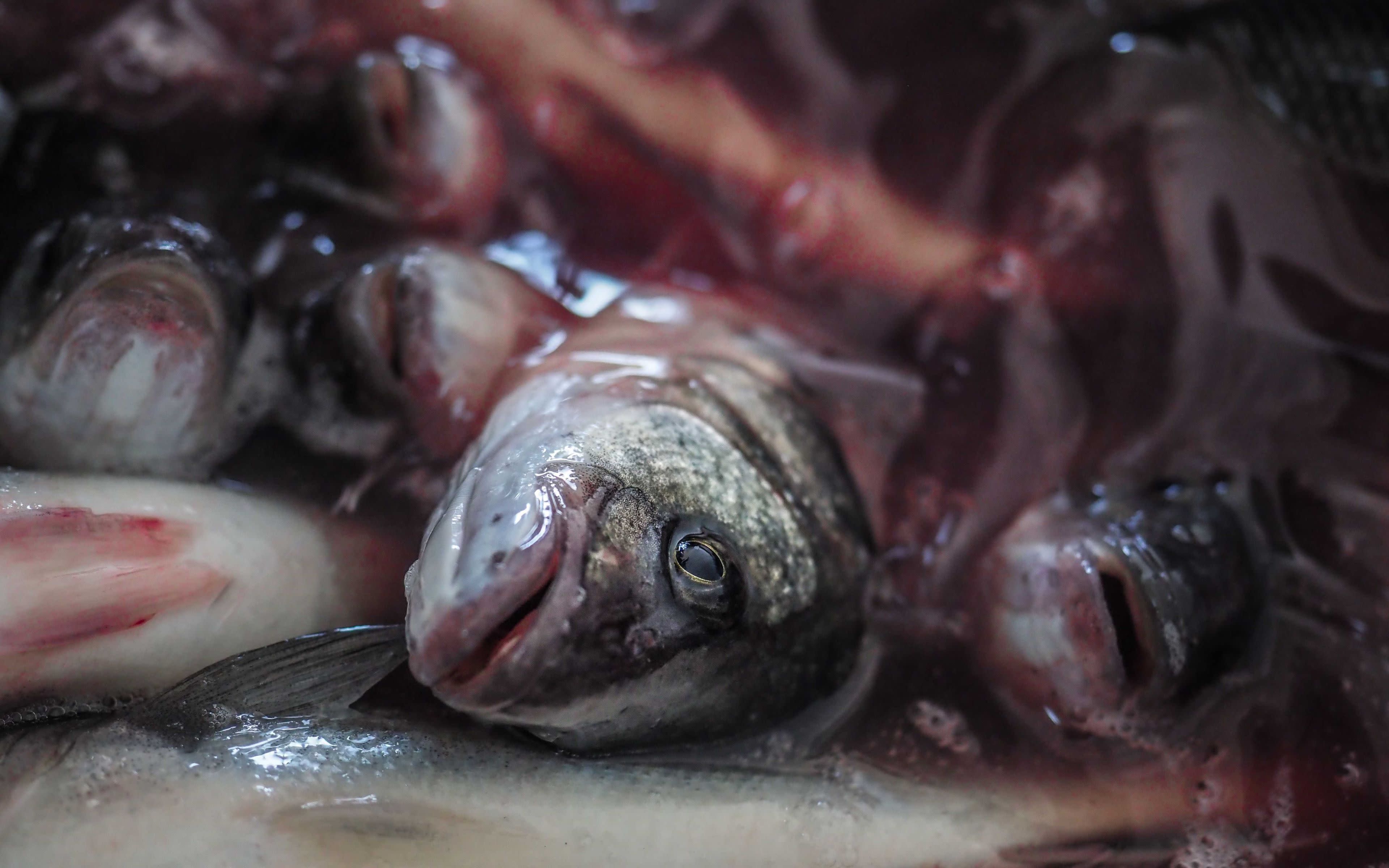




As the Supreme Court prepares to consider the National Pork Producers’ case to overturn California’s landmark animal welfare law, voices from across the political spectrum have spoken out in support of Prop 12.

In 2018, a vast majority of California voters supported Proposition 12 at the polls—landmark legislation that would outlaw some of the worst forms of cruelty that animals experience on factory farms. Despite its overwhelming support, the meat industry has spent years attacking Prop 12 and the basic protections that the law affords farm animals.
Now, the fight has escalated all the way to the United States Supreme Court. In March 2022, the US Supreme Court agreed to hear a case against Prop 12 from the National Pork Producers Council (NPPC), which claims that the law is unconstitutional.
Animal welfare advocates and organizations are no strangers to these kinds of attacks on progress from the meat industry. We've worked tirelessly to pass and uphold Prop 12 every step of the way—from canvassing voters for the original ballot initiative in 2018, to defending it against NPPC and the industry's lawsuits in the courts. But, now that Prop 12 is being challenged in the highest court of the land, the stakes are higher than ever. That's why we joined forces with major animal welfare organizations to become an intervening party in every lawsuit challenging Prop 12—including National Pork Producers Council vs. Ross, the Supreme Court case to overturn Prop 12.
Before the Court heard arguments for and against Prop 12, more voices emerged in support of the law from far beyond the animal welfare movement. Experts representing the labor movement, religious organizations, veterinary science, state and local governments, and even the agricultural industry itself have filed amicus ("friend of the court") briefs urging the justices to uphold Prop 12 in the face of the meat industry's attacks.
What does Prop 12 do?
Proposition 12, also known as the Farm Animal Confinement Initiative, is a California law that protects a vast number of pigs, chickens, and cows from some of the worst forms of abuse. The legislation bans farms from confining egg-laying hens, mother pigs (also known as "sows,"), and veal calves in a "cruel manner."
Its regulations eliminate the use of the most intensive forms of cage confinement—battery cages for egg-laying hens, gestation crates for female pigs, and veal crates for baby cows—by setting minimum space standards for each species of farmed animal in California, and requirements that companies who choose to sell their products in California comply with these same standards. Across species, the use of these cruel cages causes immense psychological distress and physical anguish. Battery cages pack dozens of egg-laying hens in a space roughly the size of a bathtub, preventing them from spreading their wings. Gestation crates restrict mother pigs to a space that's barely bigger than their own bodies—so tight, they can barely turn around. Veal crates trap baby cows in spaces so tight, they can't move around or develop their muscles properly.
Animals deserve better than a life of misery in intensive confinement. That's why Californians from across the political spectrum rallied to pass Prop 12 in their state. Despite the meat industry's objections, Prop 12 doesn't just benefit the animals whose suffering will be greatly reduced as a result of its protections—it also offers many benefits to California citizens, including better consumer choices, improved food safety, and even improved public health.
Prop 12 Amicus Briefs
Recognizing the benefits that Prop 12 has to offer, experts and organizations from across disciplines filed amicus briefs to express their support for the law ahead of the Supreme Court’s hearing.
Worker safety advocates for Prop 12
Extensive research has shown that farm facilities that concentrate thousands of animals in small spaces can become breeding grounds for infectious diseases—many of which can easily spread from animals to humans. The intensive confinement of animals makes it even easier for pathogens to jump between animals and humans, further exacerbating the public health risks of factory farming.
Although the spread of zoonotic diseases poses a risk for the entire population, no group is at higher risk than the workers on the frontlines of these factory farms. Thus, advocates for worker safety, including the National Council for Occupational Safety and Health, Food Chain Workers Alliance, and the HEAL Alliance filed an amicus brief in support of Prop 12, stating that the law would "protect thousands of California workers—particularly slaughterhouse, auction house, and animal transportation workers—from the risk of zoonotic disease." The advocates point to the fact that the use of gestation crates, which is outlawed by Prop 12, is "known to facilitate the faster and more dangerous spread of disease, which can then spread to humans."
Extreme animal confinement—particularly the conditions regulated by Proposition 12—increases the risk of zoonotic diseases jumping from animals to people. Without regulation, animal agriculture can thus introduce diseases to workers, their families, their communities, and the entire State.
The brief also reminds the Court of the disastrous impacts of COVID-19 on both workers and the broader population, and factory farm facilities were ground zero for similar disease outbreaks. Just over a decade ago, the H1N1 (swine flu) pandemic—an outbreak that originated in pigs, who spread the disease rapidly among one another in facilities with tight, shoulder-to-shoulder confinement—claimed the lives of over a quarter of a million people worldwide.
Worker safety advocates see the regulations afforded by Prop 12 as a necessary step to keep workers and their communities safe from potential future outbreaks.
Animal welfare scientists & veterinarians for Prop 12

Just by looking at images of pigs in intensive confinement, we can imagine the pain and distress they must be feeling. These mother pigs spend so much of their lives trapped in brutally tight gestation crates—unable to express any of their natural behaviors, or even turn around. But, this pain and distress is not just something we project onto animals. Animal welfare scientists and veterinarians have performed countless studies that scientifically prove how intensive confinement causes an immense—and often unnecessary—level of physical pain and distress for pigs.
Ahead of the Supreme Court hearing, 378 animal welfare scientists and veterinarians united to file their own amicus brief, believing that "the Court should have reliable information about the harms that gestation crates cause to the welfare of pigs."
Experts in the veterinary field have found ways to actually quantify the level of stress that animals experience, examining metrics like the amount of cortisol (stress hormone) in an animal's blood, as well as observing their behaviors, which can often be abnormal and even harmful in times of anguish. As a result of the frustration and boredom they experience while confined in gestation crates, pigs rely on repetitive behaviors known as "stereotypy" in order to cope—chewing on the metal bars of their crates, sometimes to the point where their mouths develop painful sores.
Pigs, by nature, are clean, active, inquisitive, social, sentient, and intelligent. Gestation crates harm their welfare because, unlike alternatives, crates inherently deny pigs their most basic physical and psychological needs.
What's worse is that, in addition to the psychological pain, gestation crates force pigs to stand, sit, and lie down in their own waste day in and day out, making them susceptible to painful urinary tract infections. Studies have also shown that pigs in gestation crates have weaker immune systems, cardiac functions, and bone strength—conditions that all result from the lack of movement from intensive confinement.
With all this research in hand, the animal welfare scientists and veterinarians used their brief to inform the Court of an undeniable fact: "Gestation crates hurt pigs." They recommend that the Court uphold Prop 12, stating that it is "reasonable and humane" for Californians to reject such cruelty in their state.
Small and independent farming businesses for Prop 12
With the dawn of industrial agriculture, the power dynamics in the US food system changed drastically. While small, family-run farms were once the main provider of most food products, huge multinational corporations began to dominate the industry as they consolidated their operations to maximize production and, in turn, profit. Companies packed thousands of animals into one facility, called a Concentrated Animal Feeding Operation (CAFO), where animals were kept indoors and often confined for a majority of their lives. These massive factory farms often push small, local farmers out of business, further increasing the companies' dominance of the industry. In fact, 90% of hog farmers have been put out of business in the last 30 years as a result of the shift toward factory farming.
Despite objections to the law from big factory farming companies, small and independent farming businesses, state farmers unions, and farm advocacy organizations believe that Prop 12 is actually a "farmer-friendly statute." In their joint amicus brief, these small and independent farmers welcome the new animal welfare standards set by Prop 12, claiming that the law will actually provide "important new production and marketing opportunities" for their businesses. After all, many of these businesses already operate using the socially and environmentally responsible practices—including cage and crate-free housing for animals. Small farmers state that they are "well-situated" to meet consumer demand for more humanely-raised, Prop 12-compliant products, and even claim that the law will encourage healthy competition in the California food market.
The small farmers' amicus brief also raises alarm that a Court ruling in favor of the National Pork Producers Council, and the large, multinational conglomerates it represents, would further tighten factory farming's vise-like grip on the food system—stifling healthy competition and granting these big companies an unfair constitutional privilege over small farms.
Perdue Premium Meat Company for Prop 12
Interestingly, it's not just small farmers that support Prop 12—Perdue Premium Meat Company, a multibillion dollar corporation and one of the biggest meat producers in the US, filed an amicus brief in support of the law, breaking ranks with other major pork producers in the industry.
In their amicus brief, the company claims that its subsidiary, Niman Ranch, has been "meeting the Proposition 12 standards and producing humanely raised pork for years." Seeing the rising consumer preference for humanely raised products in California and beyond, Perdue is confident that the industry "can and will adjust to the demands of the California market and raise hogs humanely without sacrificing their ability to earn profits."
This brief debunks the National Pork Producer Council's allegations about how Prop 12 will have an unfair negative impact on the pork industry. Perdue claims that other industry player's "apocalyptic" predictions for the economic impacts of Prop 12 are highly overblown. The argument echoes the small and independent farming businesses, pointing to the fact that hundreds of facilities already comply with Prop 12's animal welfare standards with no issues. It concludes that big industry players' resistance to Prop 12 isn't about economics at all—the issue is simply a large, powerful industry's resistance to change and fair competition.
When it comes to consumer preferences, the writing is on the wall, and those preferences will prevail with or without Proposition 12. Those producers that prepare for and embrace that change will benefit. Those suppliers that refuse to meet humane standards for the confinement of breeding pigs will be left behind.
Conservative and religious scholars for Prop 12
Many amicus briefs focus on Prop 12's proven impacts on economics, animal welfare outcomes, and public health. But, one brief dives into the moral and philosophical implications of Prop 12—specifically, the law's basis in the idea of "basic respect for animals." O. Carter Snead, a law professor and director of the de Nicola Center for Ethics and Culture at the University of Notre Dame, Mary Eberstadt, a Catholic essayist and author, and Matthew Scully, an author and former speechwriter for George W. Bush, filed a joint amicus brief providing a conservative, religious perspective in support of Prop 12.
Their brief cites texts from across faiths—including ancient Greek, Catholic, Protestant, Jewish, and Muslim traditions—that rest on the idea that "humans are morally bound to treat [animals] decently and honorably." They claim that the intensive confinement of pigs is in direct violation of the idea that humans should afford animals with basic decency. And, because of their belief that "laws are legitimately justified by moral claims," Snead, Eberstadt, and Scully argue that California voters and legislators have the right to reject extreme animal cruelty and afford basic protections for animals through Prop 12. Overall, this brief shows that Prop 12 has support from across the political spectrum—not just from progressives or animal rights advocates.
What you can do
In spite of all the support Prop 12 has gathered from across industries and ideologies—from small farmers to animal welfare organizations—the meat industry is still trying to strike it down. Although we don't yet know how the Supreme Court will rule in National Pork Producers v. Ross, the writing is on the wall: change is coming, whether the meat industry accepts it or not. More and more consumers are calling for an end to the worst forms of animal cruelty. A cage-free future is on the horizon.
Here at The Humane League, we've been working hard with a coalition of animal welfare organizations to defend Prop 12 since its inception. Alongside that work, we've been pressuring the world's biggest corporations to stop supporting factory farms that trap countless animals in cages, subjecting them to a lifetime of misery. With the help of concerned and compassionate consumers across the country, we've gotten over 500 companies to commit to eliminating battery cages from their supply chains—and we're not done yet. If you believe animals deserve better than life in a cage, join the movement to end corporate animal cruelty.
 Amanda Waxman
Amanda Waxman




